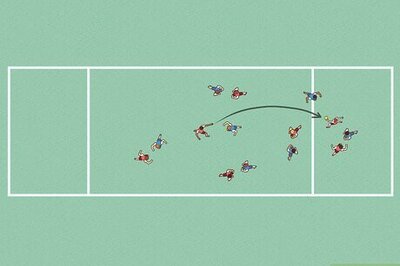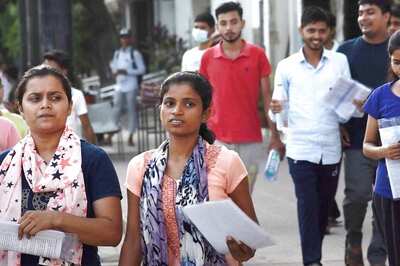
views
Islamabad: Pakistan's three-time premier Nawaz Sharif, whose power base earned him the moniker "Lion of Punjab", is a political survivor who has repeatedly roared back to the country's top office.
Sharif scored a hat trick Friday after being ousted from office yet again -- this time after being disqualified by the Supreme Court.
But the 67-year-old -- who hails from Pakistan's richest and most populous province Punjab -- has already made two seemingly unthinkable comebacks, underscoring the unpredictable nature of Pakistani politics.
A hugely wealthy steel tycoon considered strong on the economy and infrastructure, he inherited enormous problems of sagging finances and a stifling energy crisis.

He comes across as soft-spoken and shy with international media but earned a reputation for combativeness during his two previous terms as prime minister, from 1990 to 1993, and from 1997 to 1999.
He has been seen as a pragmatist in the West but raised eyebrows by calling for peace talks with the Pakistani Taliban, blamed for killing thousands of Pakistanis since 2002.
Born on December 25, 1949 into a wealthy family of industrialists in Lahore, the capital of Punjab and the political nerve centre of Pakistan, Sharif earned a law degree before joining his father's steel company.
He entered politics and under the patronage of military dictator Zia-ul Haq became first finance minister and then chief minister of Punjab -- a post he held for five years from 1985 until he was elected prime minister in 1990.
He beat arch-rival Benazir Bhutto in the polls and served a three-year term until he was sacked on corruption charges and replaced by Bhutto, before returning to power in a landslide in 1997.
With a huge majority behind him, he set about cementing his liberal economic policies and in 1998 won huge popularity when he made Pakistan a nuclear power.
But his government buckled under tensions with the army, which seized power in 1999.
Sharif was sentenced in a military court to life imprisonment for hijacking and terrorism, but was allowed to go into exile in Saudi Arabia in 2000. He returned in 2007.
"The Tiger Roars Again" screamed headlines when he won the 2013 election and became prime minister for a third time, his most remarkable comeback yet.
Clashes with military
Sharif faced a host of challenges from rolling power blackouts to the crumbling economy, a bloody homegrown insurgency and perennially fractious relations with Afghanistan and fellow nuclear power India.
His government launched a massive operation in the northwestern tribal badlands bordering Afghanistan and a crackdown against targeted killings in the southern port city of Karachi, presiding over a dramatic improvement in security.
Sharif inaugurated motorways and metro buses, and signed an historic $50 billion deal with China known as China Pakistan Economic Corridor (CPEC), touted as a "gamechanger" for the economy.
After four years some areas of the country are starting to see relief from power cuts, with electricity generation increased through a series of coal, gas-fired and solar power plants.
But Sharif has also clashed with the powerful military once more, this time over relations with India.
He and Indian counterpart Narendra Modi raised hopes of a new era when Sharif hosted Modi for a surprise Christmas Day visit in 2015.
But the visit was swiftly followed up by an attack on the Pathankot airbase in India by Pakistani militants, and the civilian government's overtures unravelled as relations plunged once more.
The corruption controversy erupted with the publication last year of 11.5 million secret documents from Panamanian law firm Mossack Fonseca documenting the offshore dealings of many of the world's rich and powerful.
Three of Sharif's four children -- Maryam, his presumptive political heir, and his sons Hasan and Hussein -- were implicated in the papers.
The Sharif family has consistently denied the allegations against them.
Pakistan is due to hold a general election next year. But with no clear succession in place, Sharif and the party which bears his name, the Pakistan Muslim League-Nawaz (PML-N), faces an uncertain future for now.

















Comments
0 comment